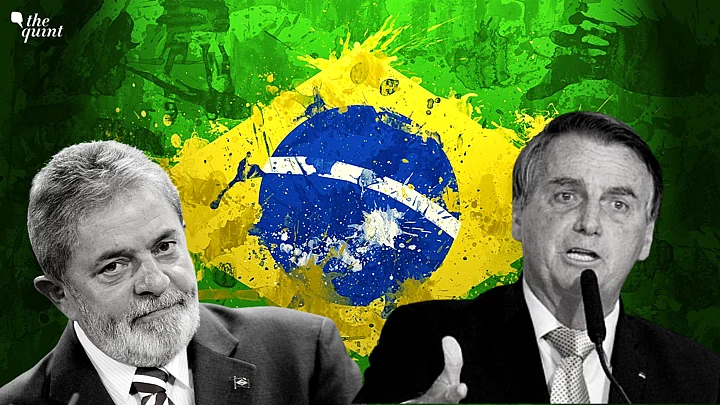The presidential race in Brazil will go to a second round after former president Luiz Inácio Lula da Silva failed to secure an overall majority on Sunday, 2 October, one that he needed to avoid a run-off against far-right incumbent President Jair Bolsonaro.
After more than 99.5 percent of votes were counted, the left veteran da Silva secured 48.3 percent of the vote, while his rival Bolsonaro significantly outperformed poll predictions and received 43.3 percent of the vote.
The presidential race heated up compared to poll surveys, with Bolsonaro revitalising his campaign after he insisted that the polls could not be trusted.
How the two key contestants performed the presidential polls? What happens next in the Brazilian Presidential race? When will the next round of voting take place? How the winner will be decided? Here’s what you need to know.
48.4 vs 43.3: Tight Election Race
Over 99.7 percent of electronic votes polled during Sunday's election have been counted, with Lula securing 48.4 percent of votes against Bolsonaro's 43.3 percent votes, the national electoral authority said.
Bolsonaro's right-wing allies also outperformed their rivals, grabbing 19 of the 27 seats that went to polls, Reuters reported.
Before the Sunday's voting, Bolsonaro had attacked the integrity of Brazil's electronic voting system, and suggested he might not concede if he lost.
While the vote was virtually free from the much-feared political violence, tensions remain high.
The Run-Off
To win the presidential race in the first round, da Silva or Bolsonaro had to receive more than 50 percent of the vote. As neither were able to achieve that, they will now dig in for a four-week bell to the final run-off vote.
The run-off election will determine whether the world’s fourth largest democracy will allow a left-candidate to return to the helm, or keep the far-right Bolsonaro in office for another term.
Bolsonaro vowed to devote more time, during the run-off, convincing the poorest sections of society that they would be better off under a far-right government than a leftist one.
Bolsonaro Defies Opinion Polls
Pre-election polls had put da Silva within touching distance of the presidential office during the first round itself, predicting more than half of the votes in his tally. However, da Silva fell short, making Brazil ready itself for another four more weeks of intense campaigning.
Da Silva, popularly known as Lula, entered the polls as the frontrunner, with the latest opinion poll before the election giving him a commanding lead and first round victory as well.
One prominent pre-election poll gave da Silva a 14-point lead for the first round. Bolsonaro surprised to the upside, coming within just 5 points. His overwhelming show of strength lowered expectations of a quick resolution to the polarised election contest.
Bolsonaro had earlier questioned opinion polls predicting his defeat to Lula in the first round and said that the polls did not capture the enthusiasm he witnessed during his campaign trail, haling the result as a win.
“He clearly outperformed, and that’s a big surprise, ” Eric Farnsworth, VP of the Council of the Americas told Al Jazeera.
“The polls proved to be incorrect in Brazil,” Farnsworth added.
Arilton Freres, director of Curitiba-based Instituto Opinião said, “This is a big defeat for the democratic centre that saw its voters migrate to Bolsonaro in a polarised scenario.”
“Lula starts ahead, but it won’t be easy for him,” Freres said, according to ABC News.
‘Some Changes Can Be for the Worse’: Incumbent Bolsonaro
Bolsonaro, a former military officer, has openly expressed his support for the two-decade-long brutal dictatorship in Brazil.
Speaking to reporters after the results were released, Bolsonaro said, "I understand there is a desire from the population for change, but some changes can be for the worse."
“I understand there were a lot of votes (cast) because of the condition of the Brazilian people, who feel prices increases, especially basic products."Bolsonaro
“We tried to show this other side in the campaign but it seems like it didn’t register with the most important layers of society," the incumbent added.
A Congressman since 1991, the far-right leader has been known for making derogatory and offensive remarks, especially against indigenous people, negroes, women, migrants, and members of the LGBTQ community.
‘This Is Just a Pause’: Challenger Lula da Silva
“During this whole campaign, I always thought we would win and we will win,” the 76-year-old said, a few moments after the result, Al Jazeera reported.
“This is just a pause. Things are not good and we need to recover this country on the world stage. We are going to win these elections – this for us is simply extra time"Lula da Silva
Lula fought his first election in 1989, after Brazil shed its authoritarian past and officially became a democracy, and lost. He also lost two more elections in the 1990s, but finally became president in 2003 and held the post for seven years. He is credyted with lifting a large number of people out of poverty with his welfare socialism policies and focus on higher education.
In 2017, Lula was sentenced to nine years in prison on charges of corruption and money laundering. Four years later, however, the country's Supreme Court annulled all the allegations against him. Lula's conviction made Bolsonaro a frontrunner in the 2018 polls and catapulted him to power.
(With inputs from Al Jazeera, The Guardian, Reuters and ABC News)
(At The Quint, we question everything. Play an active role in shaping our journalism by becoming a member today.)
